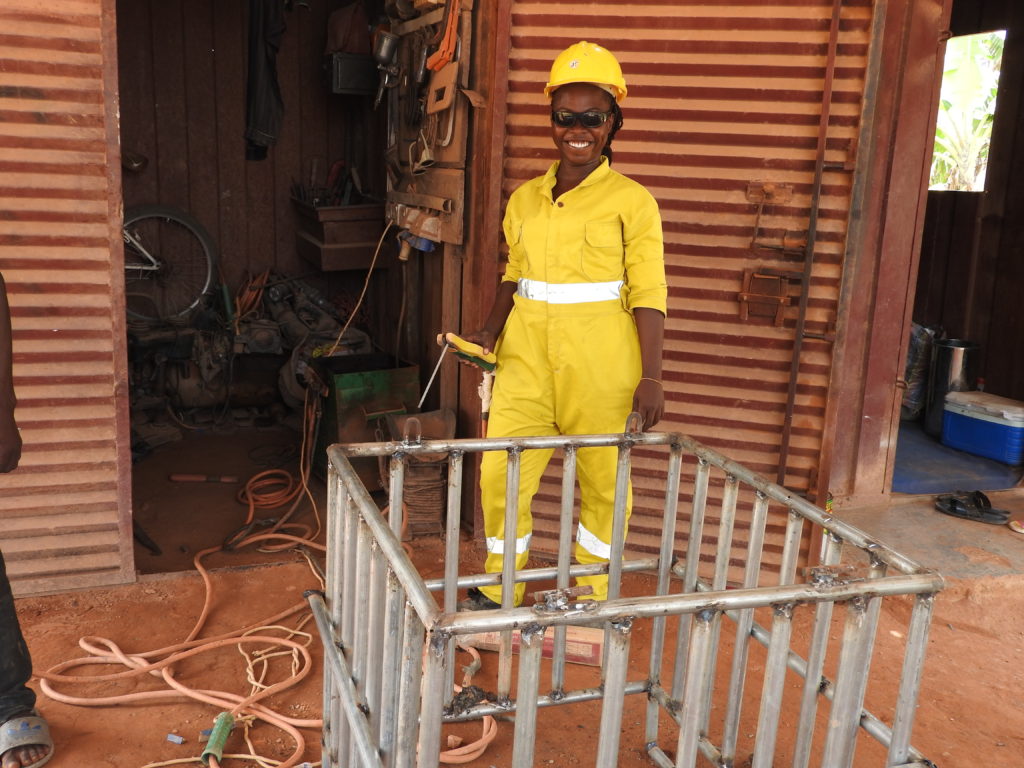Creating Opportunities for Women in Construction – What Works?
Ruth Medufia will be at the Women Deliver 2019 conference sharing her experiences on a panel moderated by former CNN journalist Isha Sesay on June 6. If you are attending the conference, please register for this or one of the Mastercard Foundation’s other sessions.
“It’s men’s work.”
That was the response 18-year old Ruth Medufia heard when she told her father she wanted to train as a welder. But Ruth was undeterred. Work was difficult to find in her home town, an urban community in Takoradi, Ghana about 225 km north of Accra. Despite applying for several jobs since graduating from high school, she was unemployed.
The growth of the construction sector in Ghana, on track to create 700,000 jobs by 2020 is in need of skilled workers, nearly 60,000 according to World Bank estimates. With the construction booming, Ruth felt she needed to go where jobs were available.
She enrolled in the Youth Inclusive Entrepreneurial Development Initiative for Employment (YIEDIE), part of the Mastercard Foundation’s Youth Forward initiative which is helping to address this gap by training 23,700 youth, including more than 8,000 young women, to become qualified and licensed tradespeople.

Regardless of the potential for higher earnings and job opportunities in the construction sector for women, there are real challenges.
For construction to attract more young women, social norms must shift and occupational segregation – the tendency for women to be employed in some sectors and not others – must be challenged, according to new research conducted by Overseas Development Institute (ODI), in partnership with the Mastercard Foundation. Interviews and focus group discussions with more than 100 young women, many in construction, found that many young women in the sector have had to overcome their family’s resistance and, in some cases, even sabotage.
The interviews revealed a prevailing belief that working in construction made women unattractive and caused infertility due to the physical nature of the work. This left young women worried that their careers would prevent them achieving other aspirations like starting a family. They also face scepticism when applying for jobs in the sector.
According to Ruth, “people with the perception that construction is for men only, sometimes refuse me jobs thinking that I cannot deliver a good job on time. Some companies or firms require that I hold a higher certificate before certain jobs or contracts can be awarded to me.”
Many young women also shared stories of sexual harassment in the sector. Ruth is one of the lucky ones and has always been treated fairly, especially once her peers saw that she was capable. She spoke highly of the master craftsman who took a keen interest in her training because he recognized that as a female welder she would face an uphill battle to find work and would need to excel.
According to the report Creating opportunities for young women in Ghana’s construction sector: What Works, there are four ways programs can provide young women with dignified and fulfilling work in the construction sector in Ghana.
- Understand and support young women’s aspirations – While a demand-driven approach is important to tackling youth unemployment, it is equally, if not more important, to understand what types of work young women consider dignified and fulfilling – i.e. giving them safety, respect and allowing them to earn an income.
- Financial incentives need to be complemented with transferable skills training – An incentives package was made available for young women in YIEDIE, for child care, health insurance, travel expenses or micro-insurance against accidents. While these incentives increased enrolment, they had limited effect on retention. Retention was increased through transferable and soft skills training, including dealing with sexual harassment, and financial skills.
- Bring in role models and mentors and engage families – Female mentors and role models are ideal because they make women feel welcome and they can imagine a future for themselves in the construction sector. In some cases, young women had found it helpful to talk to another woman about how they could protect themselves against the advances of bosses, co-workers or potential customers. Our research also showed that family resistance was greatly reduced once they saw that their daughters who benefitted from the training, were treated with respect by their employers and were earning money.
- A long-term partnership, broadening opportunities for women, while supporting mindset change is required – A program that lasts five years like YIEDIE may temporarily increase female youth participation in the sector, before young women gradually return to other professions. This could even result in a backlash, where this is seen as confirmation that women should not venture into male-dominated sectors.
Thanks to her courage, Ruth made it to the BBC’s list of 100 most inspiring women in 2018. This list includes leaders, trailblazers and everyday heroes. She set up her own shop and wanted her story to be an inspiration to others and hopes she can train women to also take up welding.
Ruth’s parents now approve and are very proud of her.
“I was learning purposely to change the mindset of young ladies who think metal fabrication is only for men – we can do what men do,” she explains.
Ruth Medufia will be at the Women Deliver 2019 conference sharing her experiences on a panel moderated by former CNN journalist Isha Sesay on June 6. If you are attending the conference, please register for this or one of the Mastercard Foundation’s other sessions.


